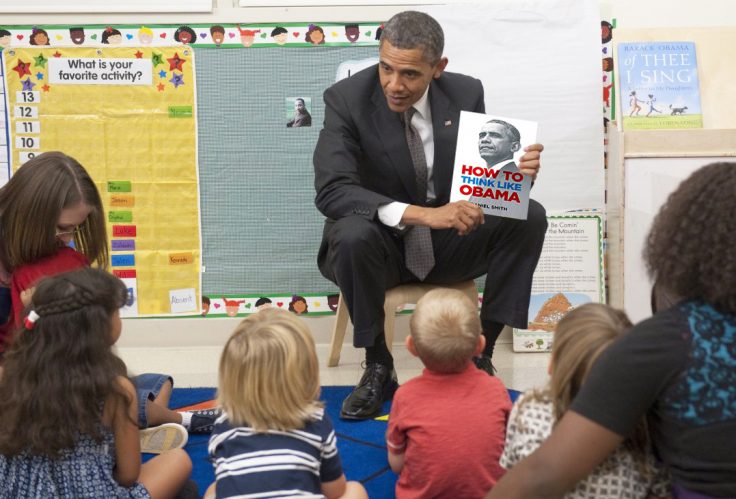What do Steve Jobs, Nelson Mandela, Albert Einstein, Winston Churchill, Bill Gates, Leonardo da Vinci, Stephen Hawking, and Sigmund Freud have in common? For starters, they have all earned the right to be mentioned in the same breath as Barack Obama in a discussion about history's greatest thinkers.
These legendary figures have all been the subject of British author Daniel Smith's "How To Think Like..." book series, which offers readers invaluable insight into the inner workings of humanity's most powerful intellects. The latest iteration, How To Think Like Barack Obama, promises instruction on how to "set the agenda," "master your own identity," "overcome any obstacle," and "make the best use of your social networks" by examining the unique cerebral tendencies of "the most relatable president ever" and "one of the most significant people of our age."
The extent to which the book succeeds depends on the extent to which one can learn how to think like Obama by skimming the presumed source material, e.g., his Wikipedia page, a Google search for "top Obama quotes," and the entries for both the president's memoirs on SuperSummary.com. Having anticipated an enlightenment of the sort experienced by Amy Adams's character in Arrival, in which her mastery of an alien language alters her perception of time and allows her to see the future, my initial reaction upon finishing How To Think Like Obama was one of disappointment.
There is something to be said, however, for the book's capacity to serve as a window to the past, and to understand how people like Daniel Smith, whose previous works include 100 Places You Will Never Visit and Think You Know It All? The Activity Book for Grown-Ups, perceive Barack Obama and his "aura of personal greatness."
Smith is certainly not alone in his assessment of Obama's intellect. To many, the former president represents... well, what exactly? A symbol of racial harmony, even if Obama "did not bring with him the answer to the race relations problem"? An empty canvas upon which millions of Americans projected their hopes, dreams, guilt, insecurities, self-righteousness, and semi-platonic lust? A transcendent politician who "not only recognizes the power of words but also happens to be a master at using them — both in the written and spoken form"?
The amount of ink Smith devotes to praising Obama's literary and oratory talents seems exorbitant. There is little original text beyond lengthy block quotes from Obama's speeches or interviews with the likes of Glamour, Vogue, and Ladies' Home Journal. Which is to say: it's entirely appropriate, given the subject matter. Beyond the obvious historic aspect of his presidency, what remains of Obama's legacy? Well, there's the healthcare law most Democratic presidential candidates are implicitly running against. And all those wonderful speeches.
Obama is "among the pre-eminent orators of his time," Smith writes, whose "now legendary" address to the Democratic National Convention in 2004 was "'one of the great political addresses of recent decades," if not "one of the great speeches of the modern age," and "likely to remain a model of speech-making for years to come." It could even be said that he "completes the triumvirate of the great presidential speakers alongside Lincoln and JFK."
Obama is the author of "one of the most notable memoirs of recent times," a "contemporary masterpiece" that marks him as "one of the most significant literary voices of his generation." In one chapter, "Read Like Obama," we are reminded that the president is also a "staunch public advocate for the power of reading" who practices this advocacy by "regularly sharing his personal recommendations through the mainstream media, social media, and personal interactions." Smith also notes that given Obama's "repeatedly avowed strong Christian convictions," it makes sense that he'd list the Bible among his "all-time best reads." Just like President Donald Trump.
The book ends up explaining less about Obama's thinking process than it does about the cultural zeitgeist that abetted his political rise. Those early, heady days of the social media revolution, before the Boomers started logging on, when "hope and change" could be a winning campaign slogan. Published authors can look back and lament in earnest, as Smith does, that one of Obama's failures as president was his inability to "usher in the era of greater international harmony that his Nobel Peace Prize had seemed to promise," even as his "culinary passions held an enduring fascination for political commentators."
It really makes you think.
